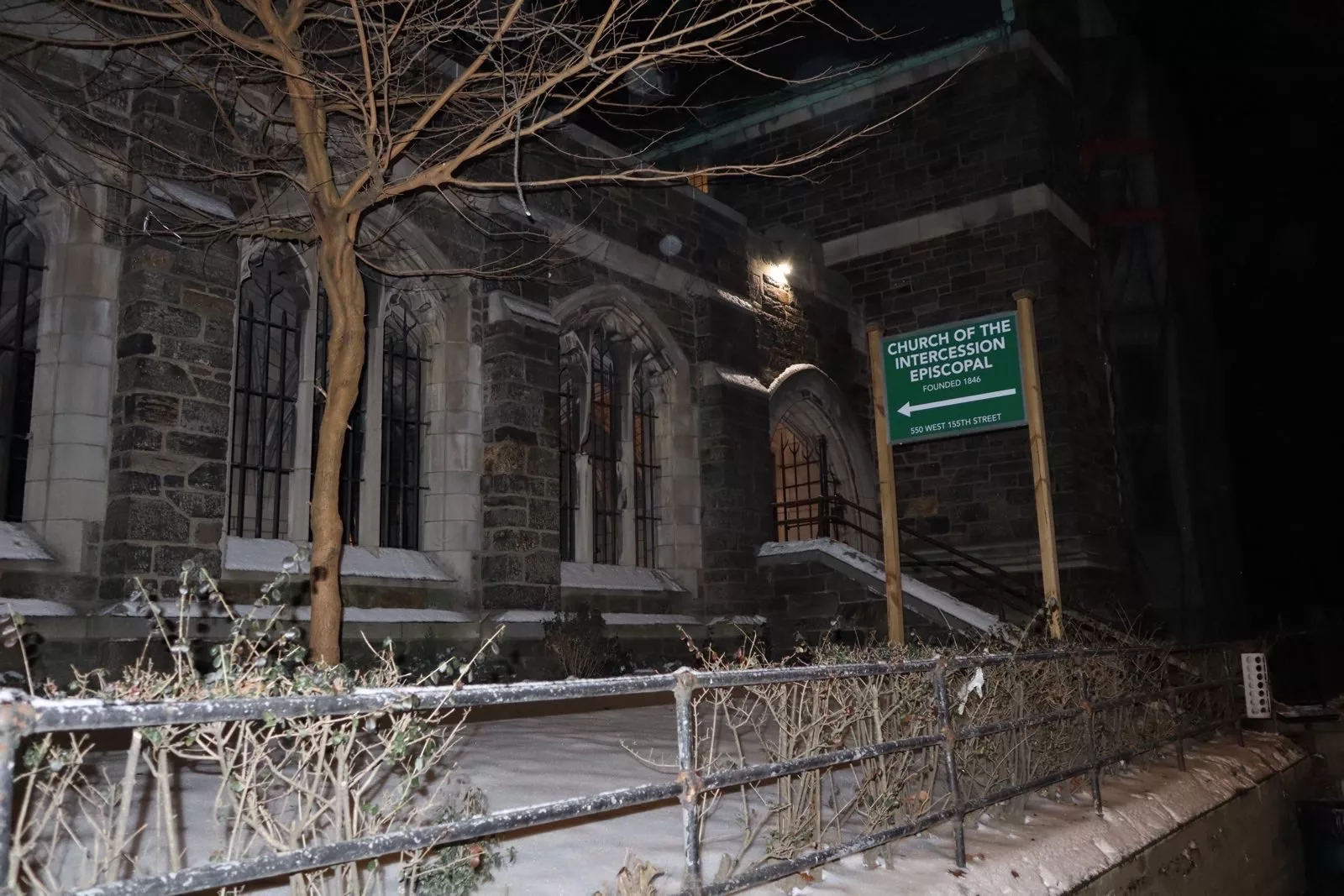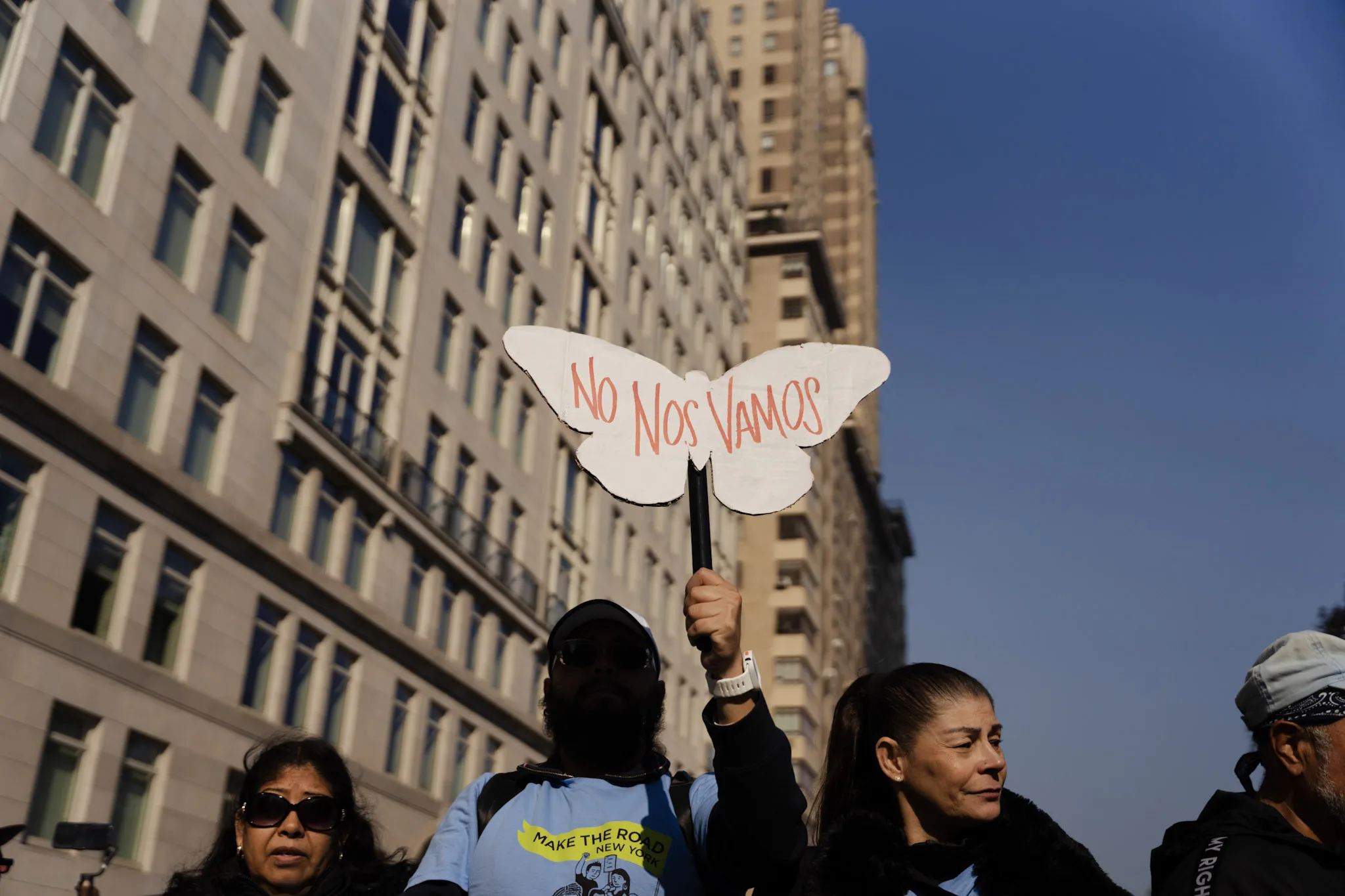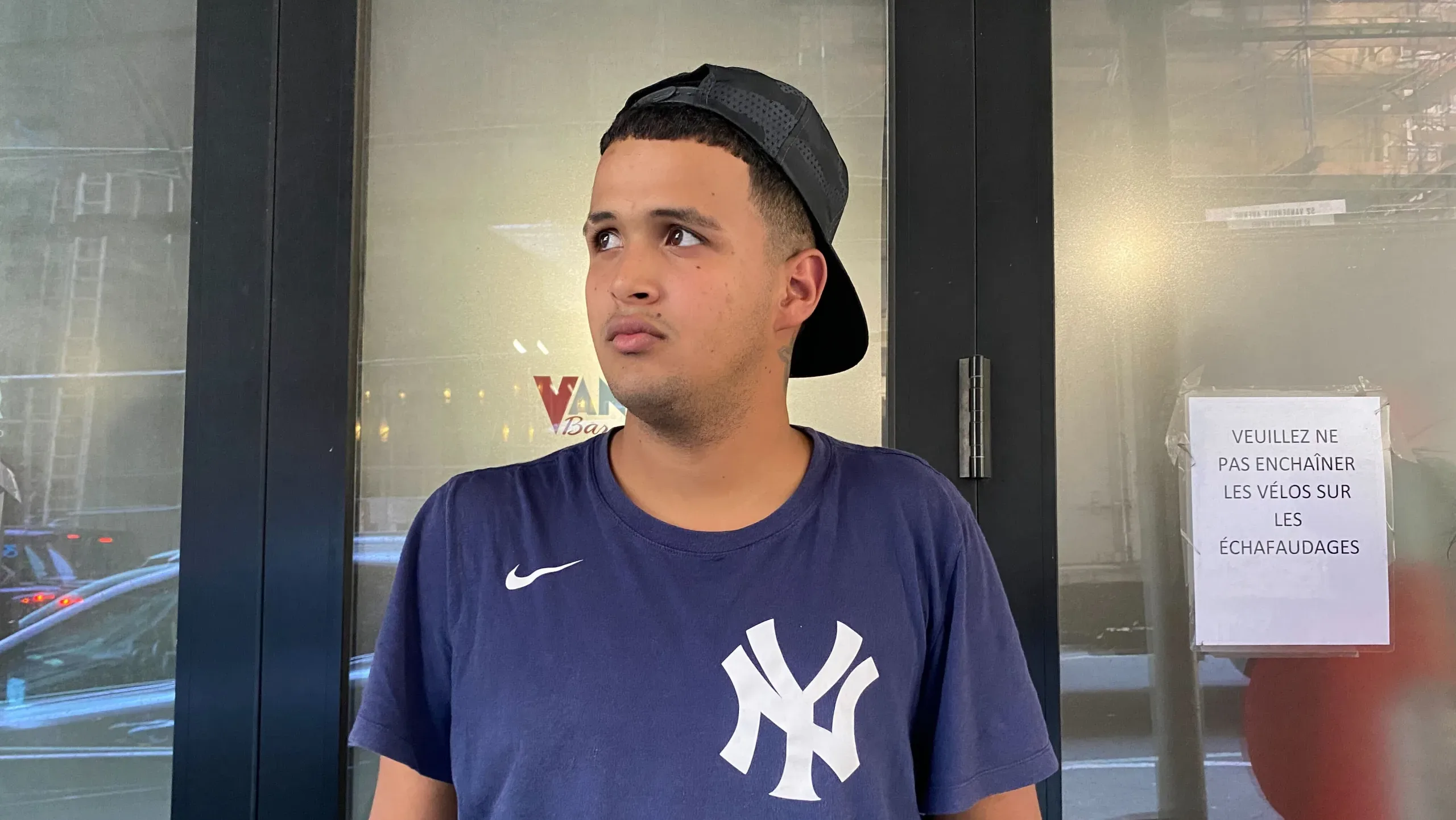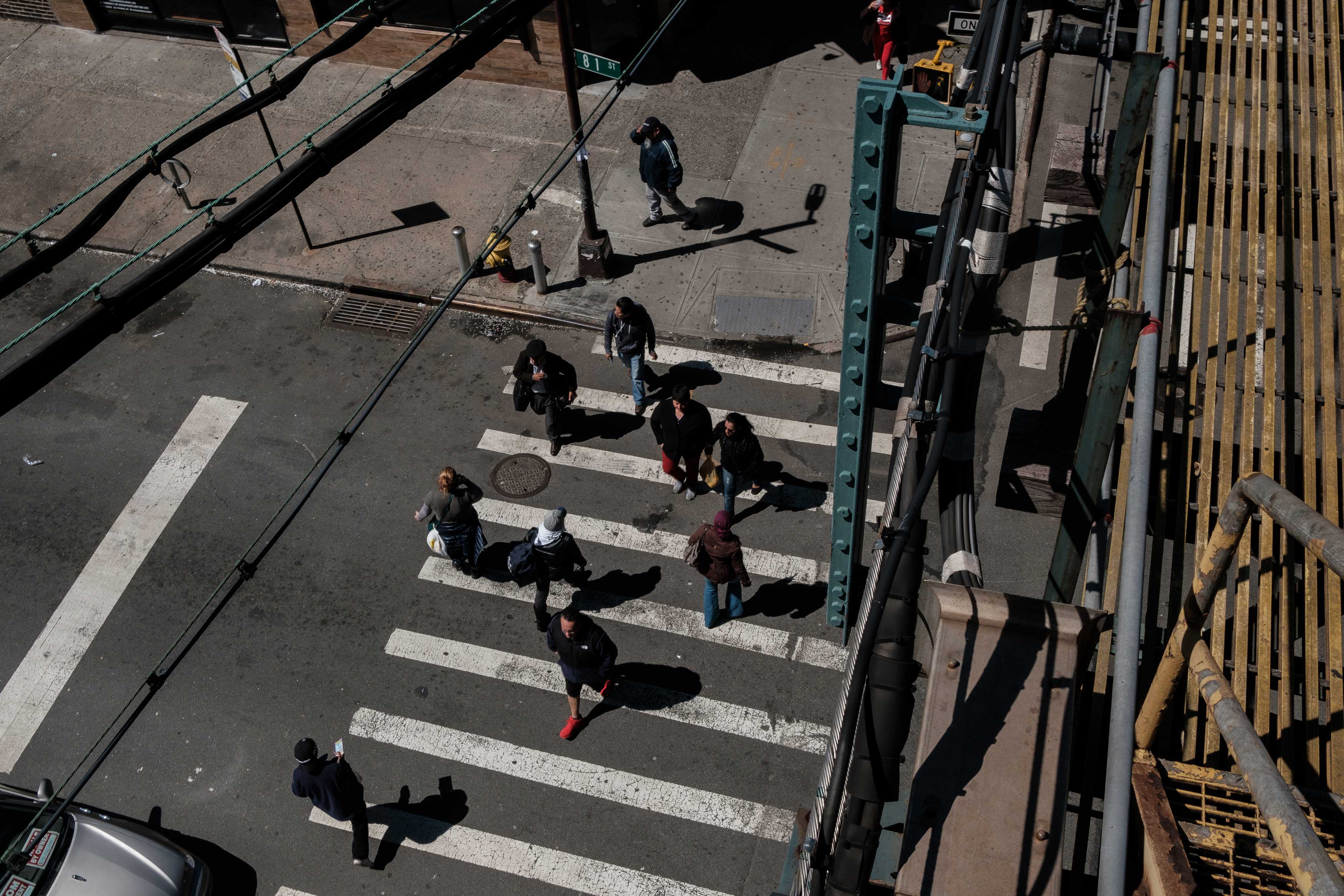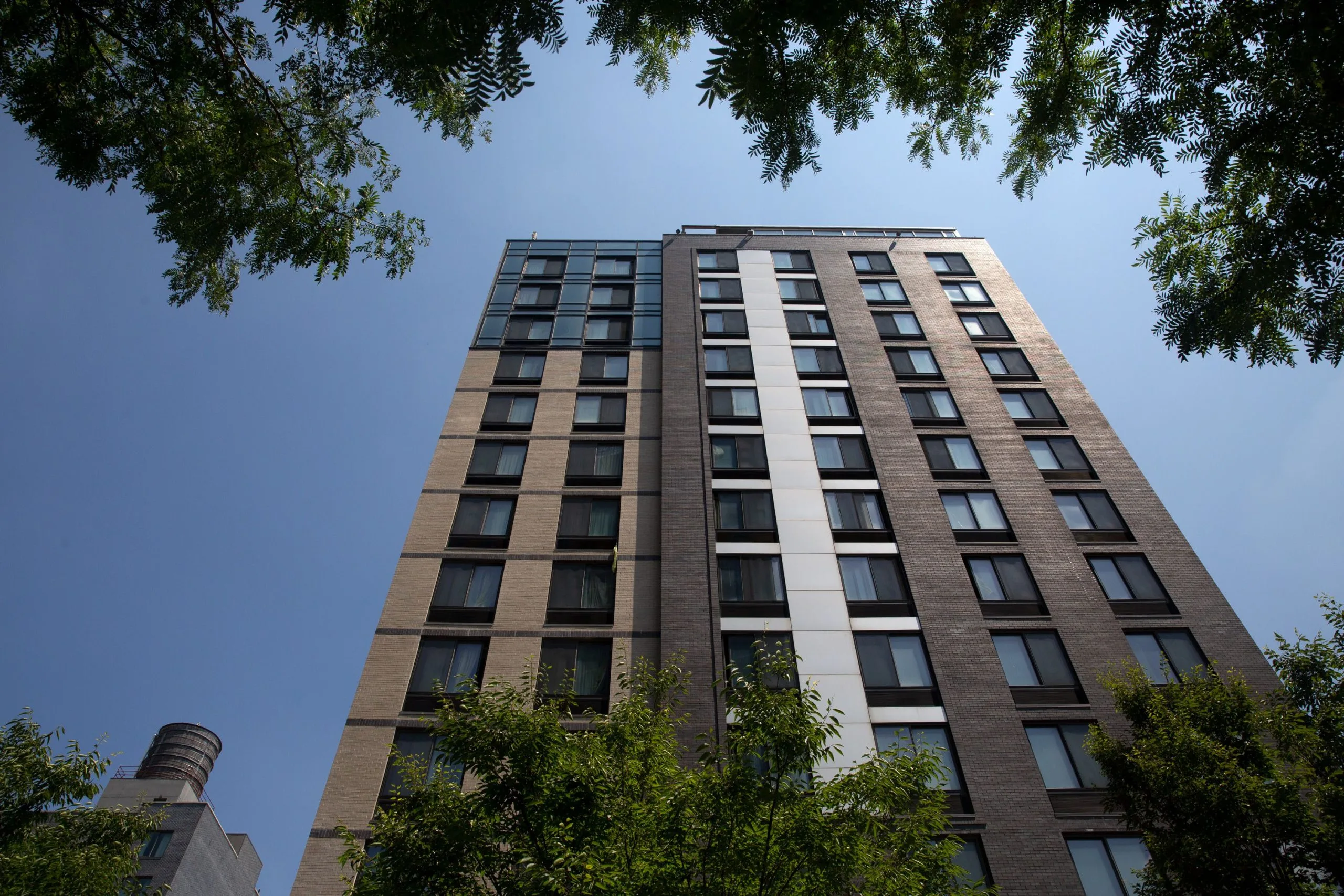The migrant men lay their blankets on the wood floor, where they would spend the night. Many had not been able to shower in more than a week. Others said they felt sick as their coughs echoed through the room. The recent snowstorm added urgency to the need for housing, which for the migrants, had no sign of coming anytime soon.
As temperatures dropped, they had spent the day wandering Manhattan after not receiving a shelter assignment at the St. Brigid intake site in the East Village until they had arrived at a gym in an Upper Manhattan church for a place to sleep.
“You feel alone, abandoned, without anything — like you’re going to die on the street,” said Yorbi Rivera, a 29-year-old migrant from Venezuela who had spent time sleeping in the subway, and was spending his second night in the church on Wednesday evening.
Many of these men, primarily from West Africa and Latin America, said they had been evicted from shelters for single migrants after 30 days, following the city’s policy announced in September. As of early December, 35,900 30 and 60-day notices have been issued, according to City Hall data published by the Comptroller’s Office.
The evictions thrust them into dire housing conditions in the midst of below freezing temperatures. Several migrants at the church said they feared for their well-being.
For Amadou Sadio Cissé, the thoughts of helping his own family kept him going amidst these challenging few weeks, he said. Cissé had been in New York for about three months and had made the journey to the city from Guinea. On Wednesday night in the church gym, he pulled up his phone screensaver, which showed a picture of his 4-year-old son. “The little money I make, I send it to my family,” he said.
Cissé had been sleeping at the church for ten nights after being evicted from his shelter, and said he was not prepared for New York’s January weather. He only had one blanket to share with his friend to sleep on Wednesday night. “When it’s cold, my bones hurt,” he said in Spanish, a language which he had learned from friends and his journey to the U.S. Cissé looked at the men around him. “It’s hard for all of the people here right now.”
Also Read: Donations and Coats: Volunteers Needed to Help Migrants in NYC
Unable to find work yet to pay for rent, migrants said they requested new shelter placements at the St. Brigid intake site in the East Village. But the wait time to be placed in a new shelter has been climbing. The average wait time for a placement system-wide is about seven days, according to City Hall. Some men told Documented that they had been waiting upwards of two weeks for the city to assign them a new place to sleep.
After the East Village site closed for the day, staff at St. Brigid redirected some migrants to the Church of the Intercession, an Episcopal congregation in Upper Manhattan. Other migrants said they had heard about the church from other hotel shelters or friends who had slept there.
Felipe Blanco, 26, had been requesting shelter at St. Brigid for 12 days, and on Wednesday had been standing in line outside for three hours, he said. “You don’t last a long time outside. You get sick. Last night I had a fever all night,” Blanco, who is from Venezuela, said while he set out his blanket on Wednesday night. “Last night I felt like I was going to die here. I felt so cold inside.”
Also Read: 4,800 Migrant Families Face Eviction From NYC Shelters
While they waited for a shelter placement, migrants looked for winter clothes donation drives, asked passersby for food, and searched for work. Sometimes, they slept in subway stations to shield themselves from the temperatures until police told them to leave.
The church opens its doors at 8 p.m., hours after the sun goes down. Inside, resources are still scarce. There are no cots to sleep on or showers in the building. The church gives migrants water, fruit, and bagels, but does not make regular hot meals. And in the morning, migrants are required to leave again.
Rivera, from Venezuela, was shuffled around several different shelters in the eight months he has lived in New York, and then was evicted. “The snowfall got me while I was on the street. I was with my suitcase and I didn’t have anywhere to go. I was freezing,” he said. “You get sad.”
Under a contract with the city until August, the church recently started offering “drop-in” hours for migrants three weeks ago, beginning at 8 p.m. every night and ending at 8 a.m., said the church warden, Valerie West, who helps coordinate with the city and opens the building for the migrants in the evenings.
There are five current drop-in centers across the city, including the Church of the Intercession. Migrants are referred here from St. Brigid, and can stay at the centers when St. Brigid is not open as well as when a code blue is in effect, according to City Hall. There are an average of about 900 migrants staying across these five facilities every night. City Hall is officially calling the drop-in facilities “overnight hospitality centers.”
“More than 60 percent of migrants who have been in our care have taken that next step, and our 30-and-60-day notice policy is another tool in our very limited toolbox to help people do so,” Kayla Mamelak, a spokesperson for Mayor Adams said. “Anytime New York City’s temperatures dip below freezing, we redouble our efforts to bring people inside, offering a place to stay warm, in accordance with the law.”
Rev. James Hagen, the interim priest at the church, said that many of the migrants are unprepared for the cold, don’t have the right clothing, and arrive “completely disoriented” at the church. “It’s really a very desperate situation for them,” Rev. Hagen said.
Also Read: Shelter Shuffle Leaves Hundreds of Migrants Waiting Outside In Below-Freezing Temperatures
The staff of the church tries to serve the migrants to the best of their abilities, but resources and volunteers are limited, West, the warden, said. There are kitchen facilities on church grounds that could be used to cook full meals, West said, but they would need more volunteers to do so. West says she hopes to eventually put in showers and give out winter clothes.
“A lot of what we could do is already here — we just need the volunteers to come in, and the resources,” West said. “Right now it’s a skeleton staff.”
Usually, 215 to 285 migrants sleep in the building every evening, West said. The church has capacity for 300 migrants, and a few nights the church has had to house more than that. Rev. Hagen told Documented that the city reached out to the church looking for space where migrants could sleep. The city pays for managers and security guards to stay throughout the evenings. “The purpose of [the program] is to get people off the streets so that they can at least be safe, and in a warm place — but it’s not a shelter,” Rev. Hagen said. “We’re talking about basic survival here, of people who come ill equipped. They’ve never seen a climate like this.”
On Wednesday night, migrants began arriving at the doors of the church before 7 p.m. to line up outside, and pick their spot to sleep in the gym. Their belongings were crammed into backpacks, suitcases and grocery bags as they walked from the sidewalk up the steps. “They have their whole life in their hands,” West said.
For Dennis Clemente, Wednesday evening marked more than two weeks since he began sleeping at the church, while he waited for the city to assign him a shelter after being evicted from one.
Clemente, who is from Angola and has four children who are still there, said that he was grateful for the help that the church had given him. But he hadn’t showered in about 10 days, had not eaten a warm meal in weeks, and was dreading standing in the line outside St. Brigid once again the following day.
“I’m really tired,” he said in a mix of Spanish and Portuguese, holding a folded up pillow in a grocery bag next to him.
The next morning, Clemente would once again have to pack up his belongings and head out to the street. Migrants said they are sometimes told to leave the church in the early hours of the morning, around 5 a.m., though church staff says the program runs until 8 a.m.
For him, the so-called American dream has become “a dream that’s very hard to believe in,” Clemente said. “The reality is a different thing.” Still, he added, “We will endure.”
